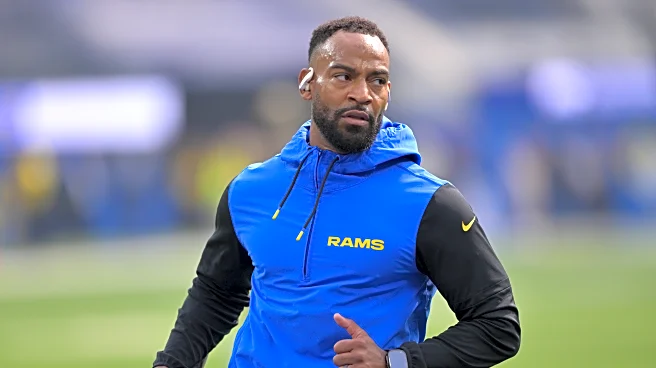What's Happening?
Jamie Dimon, CEO of JPMorgan Chase, has expressed concerns about a potential recession in 2026, despite current economic indicators showing growth. In a recent interview, Dimon highlighted several factors contributing to his cautious outlook, including the impact of tariffs on inflation, geopolitical tensions, and uncertainties in the labor market. He also noted the potential effects of artificial intelligence on economic returns. Dimon's comments come as the U.S. GDP grew at an annual rate of 3.8% in the second quarter of 2025. However, he remains wary of the economic outlook, citing a weakening American economy and the potential for economic contraction. Dimon also criticized the ongoing government shutdown, which he believes could complicate the Federal Reserve's upcoming decision on interest rates due to a lack of key federal data.
Why It's Important?
Dimon's warning is significant as it comes from a leading figure in the financial industry, whose insights are often seen as a barometer for the U.S. economy's health. His cautionary stance suggests that while current economic indicators are positive, underlying risks could lead to a downturn. This perspective could influence investor sentiment and policy decisions, particularly as the Federal Reserve prepares to meet without crucial economic data due to the government shutdown. The potential recession could impact various sectors, from finance to manufacturing, affecting employment and consumer spending. Dimon's remarks also highlight the broader implications of policy decisions, such as deregulation and stimulus measures, which could have mixed effects on economic growth and inflation.
What's Next?
The Federal Reserve is set to meet soon to decide on interest rates, a decision that will be made without key economic data due to the government shutdown. This could lead to increased uncertainty in financial markets. Additionally, policymakers and business leaders will likely continue to monitor economic indicators closely, balancing growth opportunities with potential risks. Dimon's comments may prompt further discussions on economic resilience and the need for strategic planning to mitigate potential downturns. Stakeholders across industries may also reassess their strategies in light of these warnings, considering both short-term gains and long-term stability.
Beyond the Headlines
Dimon's remarks underscore the complex interplay between economic policy, market dynamics, and technological advancements. The potential impact of artificial intelligence on economic returns is a critical area of interest, as it could reshape industries and labor markets. Furthermore, the ongoing government shutdown highlights the vulnerabilities in relying on federal data for economic decision-making. These developments may prompt a reevaluation of how economic health is assessed and the role of government in ensuring stability. The situation also raises ethical considerations about the social impact of economic policies, particularly on vulnerable populations affected by potential recessions.










